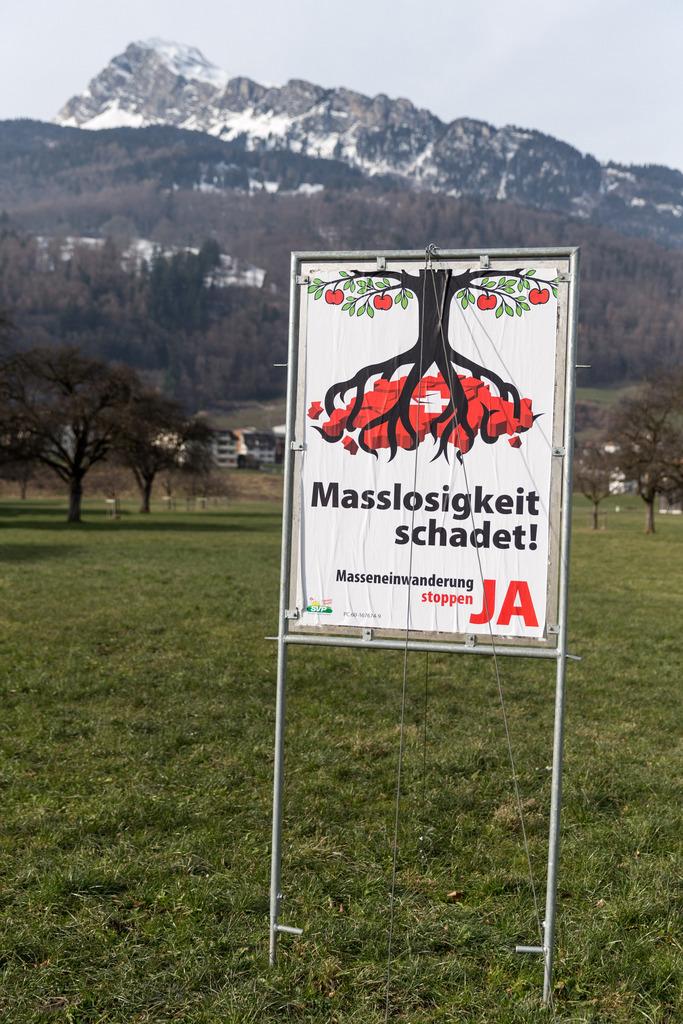Switzerland accused of undermining international laws

In its annual report, the human rights organisation Amnesty International singled out the clash between international human rights laws and Swiss popular initiatives as problematic, as well as Switzerland’s deportations, prisons and headscarf policies.
The report released on Wednesday indicated a general anti-immigration trend in Europe.
“The influence of nationalist, thinly-veiled xenophobic attitudes was particularly evident in increasingly restrictive migration policies, but it was also reflected in the growing distrust of supra-national authority,” the report said.
Switzerland in particular was accused of attacking established human rights frameworks and principles.
“The UK and Switzerland led the charge, with ruling parties in both countries openly attacking the European Court of Human Rights and discussing withdrawal from the Convention system,” the report said, adding that popular initiatives like quotas for EU workers and deportation of foreign criminals were incompatible with Switzerland‘s obligations under international human rights law.
“It is a shame that two democratic countries like Switzerland and the UK, who have benefited from the European Court of Human Rights, now challenge it due to the pressure from fringe groups,” Nadia Boehlen, spokesperson for Amnesty International in Switzerland, told swissinfo.ch.
“There is political movement backed by the Swiss People’s Party that is calling into question the European Court of Human Rights and international human rights themselves saying that Switzerland is sovereign and does not need to heed them,” she added.
“The Swiss People’s Party has indeed criticised the dynamic and over-the-top practice of the European Court of Human Rights (ECHR) many times,” Martin Baltisser, secretary of the party told swissinfo.ch.
“The party is not questioning human rights. These are much more established in the federal constitution and were respected and acted upon by Switzerland before they even signed up to the European Convention on Human Rights,” he added.
The Amnesty report indicated that Switzerland should follow the UN Committee on the Elimination of Racial Discrimination (UN CERD) recommendations to set up an independent mechanism to ensure that no conflict occurs between Swiss initiatives and international human rights laws.
“Such an independent mechanism would be useful on many levels,” said Boehlen. “It would help prevent incompatible initiatives in the first place and also aid in the application of current initiatives that are in conflict with international laws.”
The Swiss People’s Party has a different solution. “The party has, amongst other things, set up the people’s initiative Swiss laws instead of foreign judgesExternal link which will bring clarification to the relationship between federal state law and international law,” says Baltisser.
Deportation and discrimination
The Amnesty report also cited accusations levelled against the police by the Swiss National Commission for the Prevention of Torture (NCPT) and NGOs for the use of excessive force and restraints during deportations. The danger posed to deported migrants was also raised in the context of the two Tamil asylum seekers who were arrested after being deported back to Sri Lanka in 2013.
Furthermore, the report flagged up a recent Swiss preoccupation with headscarves and veils. A St Gallen school’s ban on headscarves in March 2014 and the ban on full face veils in Ticino in 2013 were highlighted as signs of intolerance. The report also mentioned UN CERD’s recommendations to the Swiss government to clearly define racial discrimination in all aspects of the law to ensure protection of victims. The Committee had also asked the government to prevent racial or ethnic profiling by the police during identity checks, searches and other police operations.
Finally, the Swiss failed to meet international standards when it came to satisfactory prison conditions. The Champ-Dollon prison in canton Geneva got special mention for inhumane conditions of detention and overcrowding.

In compliance with the JTI standards
More: SWI swissinfo.ch certified by the Journalism Trust Initiative













You can find an overview of ongoing debates with our journalists here . Please join us!
If you want to start a conversation about a topic raised in this article or want to report factual errors, email us at english@swissinfo.ch.